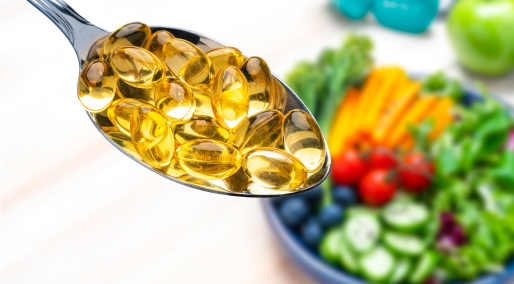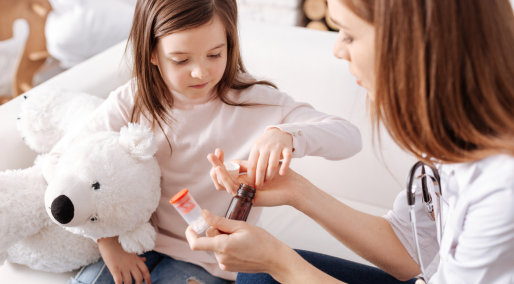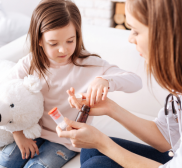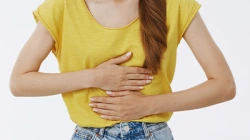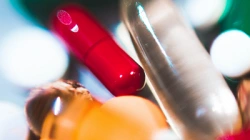.webp)
.webp)

Patryk Chodyniecki
Symptoms of hormonal disorders
- HORMONAL DISORDERS SYMPTOMS
- HORMONAL DISORDERS IN WOMEN AND MEN
- SIGNS OR SYMPTOMS IN CHILDREN
- CAUSES OF HORMONAL DISORDERS
- HORMONAL DISORDERS - HOW TO TEST?
- HORMONAL DISORDERS TREATMENT
- NATURAL RESOURCES AND SUPPLEMENTS
- HORMONAL DISORDERS - VISIBLE SYMPTOMS
- OTHER COMPLICATIONSHormonal imbalances are linked to many chronic or long-term conditions. Without proper treatment, you could be at risk of several serious conditions, including
Hormones are your body's chemical messengers. Produced in the endocrine glands, these powerful chemicals travel through the bloodstream telling tissues and organs what to do. They help control many of the body's major processes, including metabolism and reproduction.
Many people have hormonal disorders that are manifested by their excess or deficit. Think of hormones as a recipe for a cake, i.e. too much or too little of one ingredient affects the final product.
While some hormone levels fluctuate throughout life and may simply be the result of natural aging, other changes occur when endocrine glands malfunction.
HORMONAL DISORDERS SYMPTOMS
Hormones play an integral role in your overall health. As a result, there is a wide range of signs or symptoms that can signal a hormonal imbalance. Your signs or symptoms will depend on which hormones or glands are not working properly.
Common hormonal problems affecting both men and women can cause one of the following symptoms:
- weight gain
- a hump of fat between the arms
- unexplained and sometimes sudden weight loss
- fatigue
- weak muscles
- muscle pain, tenderness and stiffness
- joint pain, stiffness or swelling
- increased or decreased heart rate
- increased sensitivity to cold or heat
- constipation or more frequent bowel movements
- frequent urination
- increased thirst
- increased hunger
- decreased sex drive
- depression
- nervousness, anxiety or irritability
- purple or pink stretch marks
Keep in mind that these symptoms are non-specific, meaning having them doesn't necessarily mean you're hormonally imbalanced.
HORMONAL DISORDERS IN WOMEN AND MEN
Hormonal disorders in women of reproductive age Polycystic ovary syndrome (PCOS) is the most common hormonal imbalance.
Symptoms of hormonal imbalance in adult men include:
- gynecomastia, or development of breast tissue
- breast tenderness
- erectile dysfunction (ED)
- reduce beard and body hair growth
- loss of muscle mass
- bone loss, otherwise known as osteoporosis
- difficulty concentrating
- hot flashes
SIGNS OR SYMPTOMS IN CHILDREN
Boys and girls start producing sex hormones at puberty. Many children with delayed puberty will experience normal puberty, but some have a condition called hypogonadism.
CAUSES OF HORMONAL DISORDERS
There are many possible causes of hormonal imbalance, which vary depending on which hormones or glands are damaged or malfunctioning.
The most common causes of hormonal imbalance are:
- hormone therapy
- taking medication
- cancer treatments such as chemotherapy
- tumours, cancerous or benign
- pituitary tumors
- eating disorders
- stress
- injuries
HORMONAL DISORDERS - HOW TO TEST?
Depending on your symptoms, your doctor may suggest one or more diagnostic tests.
You can also ask your doctor for these tests:
I. Blood test
Your doctor will send a sample of your blood to the lab for testing. Most hormones can be detected in the blood. Your doctor may ask for a blood test to check your thyroid, estrogen, testosterone, and cortisol levels.
II. Pelvic examination
If you are a woman, your doctor may take a Pap smear to feel for any unusual lumps, cysts or tumors. If you are male, your doctor may check your scrotum for lumps or abnormalities.
III. Ultrasounds
An ultrasound uses sound waves to look inside your body. Doctors may request an ultrasound to obtain images of the uterus, ovaries, testicles, thyroid, or pituitary gland.
IV. Additional tests
Sometimes more advanced tests are required.
Can be:
- biopsy
- MRI i.e. magnetic resonance imaging
- RTG
- thyroid scan
- sperm count test
HORMONAL DISORDERS TREATMENT
Hormone imbalance treatment will depend on what is causing it. Some typical treatment options are described below.
I. Estrogen therapy
If you are experiencing hot flashes or other uncomfortable menopausal symptoms, your doctor may prescribe a low dose of estrogen. However, be sure to discuss the risks and benefits of hormone replacement therapy (HRT) with your doctor.
II. Vaginal estrogen
If you experience vaginal dryness or pain during sex, you can try an estrogen cream, tablet or ring. Using this topical therapy helps eliminate many of the risks associated with systemic estrogen moving through the bloodstream to the relevant organ.
III. Anti-androgens
Androgens are male sex hormones present in both women and men. Women with high androgen levels may choose to take androgen blockers.
These effects include:
- hair loss
- beard growth
- acne
IV. Testosterone therapy
Testosterone supplements may reduce symptoms of low testosterone in men. In adolescents with delayed puberty, testosterone stimulates the onset of puberty. It is available in many forms, including injection, patch and gel.
V. Thyroid hormone therapy
If you have hypothyroidism, the synthetic thyroid hormone levothyroxine (Levoxyl, Synthroid, Unithroid) can restore your hormone balance.
VI. Metformin
Metformin is a type 2 diabetes medication that may help some women with PCOS symptoms. The FDA has not approved it for the treatment of PCOS, but it may help lower androgen levels and encourage ovulation.
VII. Flibanserin (Addyi) and bremelanotide (Vyleesi)
Addyi and Vyleesi are the only drugs approved by the FDA for the treatment of low sex drive in premenopausal women. Addyi is a pill and Vyleesi is a standalone injectable drug.
NATURAL RESOURCES AND SUPPLEMENTS
There are many dietary supplements on the market that claim to treat menopause and hormonal imbalances. However, few of them are supported by scientific evidence. Many of these supplements contain plant-derived hormones. These are sometimes called "bioidentical" hormones because they chemically resemble the body's natural hormones. However, there is no evidence to suggest that they work better than regular hormone therapy.
Some people find that yoga helps treat symptoms of hormonal imbalance. Yoga is great for your strength, flexibility and balance. It can also help with weight loss, which can help regulate hormones.
You can also make the following lifestyle changes:
- Lose Weight: A 10% reduction in body weight for women can help make your periods more regular and increase your chances of getting pregnant. Weight loss in men can help improve erectile function.
- Eat healthy: A balanced diet is an important part of your overall health.
- Reduce vaginal discomfort by using lubricants or moisturizers that are free of parabens, glycerin and petroleum.
- Avoid hot flashes: Try to identify things that often trigger hot flashes, such as high temperatures, spicy foods, or hot drinks .
- Remove unwanted hair: If you have excess facial or body hair, you can use hair removal cream, laser hair removal or electrolysis.
.webp)
Acne is often associated with hormonal changes during puberty, but there is actually a link between acne and lifelong hormones .
-
Acne and menstruation
The menstrual cycle is one of the most common acne triggers. For many women, acne develops a week before menstruation and then resolves. Dermatologists recommend hormone testing for women who have acne in combination with other symptoms, such as irregular periods and excessive facial or body hair.
-
Acne and androgens
Androgens contribute to acne by overstimulating the sebaceous glands. Both girls and boys have high levels of androgens during puberty, which is why acne is so common during this time. Androgen levels usually settle in the early twenties.
-
Hormonal imbalance and weight gain
Hormones play an integral role in metabolism and the body's ability to use energy. Hormonal disorders such as Cushing's syndrome can make you overweight or obese. People with Cushing's syndrome have high levels of cortisol in their blood. This leads to an increase in appetite and fat storage.
Hypothyroidism, if severe, can also lead to weight gain. During menopause, many women gain weight because their metabolism slows down, so you may find that even if you eat and exercise as usual, you still gain weight.
The only way to treat weight gain due to hormonal imbalance is to treat the underlying disease.
-
Hormonal imbalance and pregnancy
During a normal, healthy pregnancy, your body goes through major hormonal changes. This is different from hormonal imbalance.
-
Pregnancy and PCOS
Hormonal imbalances such as PCOS are among the leading causes of infertility. With PCOS, hormonal imbalance interferes with ovulation. It's simple: you can't get pregnant if you're not ovulating.
-
Hormonal imbalance and hair loss
Most hair loss, such as male pattern baldness, is hereditary and unrelated to hormonal changes. However, hormonal changes and imbalances can sometimes cause temporary hair loss.
For women, this is often associated with:
- pregnant
- birth
- beginning of menopause
An overproduction or deficiency of thyroid hormones can also cause hair loss.
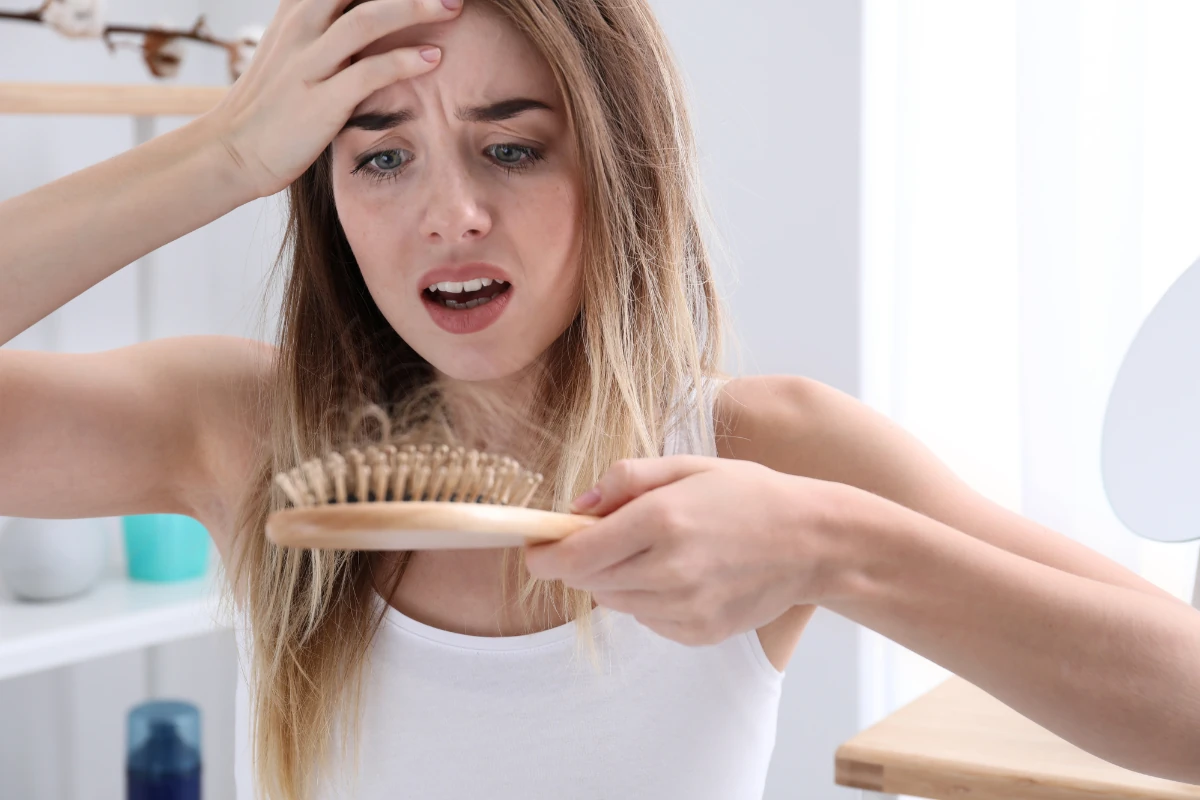
OTHER COMPLICATIONS
Hormonal imbalances are linked to many chronic or long-term conditions.
Without proper treatment, you could be at risk of several serious conditions, including:
- type 1 and type 2 diabetes
- diabetes insipidus
- high blood pressure
- high cholesterol
- various heart diseases
- neuropathy
- obesity
- sleep apnea
- kidney damage
- depression and anxiety
- breast cancer
- osteoporosis
- loss of muscle mass
- inability to hold urine
- infertility
- sexual dysfunction
Hormones are responsible for many of the body's major processes. When hormones are out of balance, symptoms can vary greatly. Hormone imbalance can cause many serious complications, so it's important to start treatment as soon as possible. Let us remember that most often both the deficiency and excess of certain hormones cause health disorders and make life difficult. Thyroid diseases, including hyperthyroidism, skin changes, decreased libido, imbalance of the body and maintaining the body's condition at the appropriate level, largely depend not only on the hormones themselves, but also on our genetics and lifestyle.
.png)
hormonehealth.co.uk - 10 warning signs you may have a hormonal imbalance and what to do about it
www.cwhwichita.com - 8 symptoms of hormone imbalance
www.healthline.com - Hormonal imbalance
Rate the text

Patryk Chodyniecki








